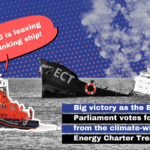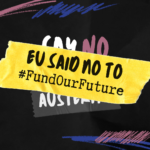MEDIA ADVISORY
Today, EU ministers meeting at an Energy Council and a General Affairs Council will discuss respectively the priorities for the future energy infrastructure and for the future EU Cohesion Policy funding for climate action in the regions.
According to the current state of play of negotiations, EU Member States, as they plan to continue investments in fossil gas, are falling short of what the Paris Agreement requires in terms of zero-carbon energy policies and climate action financing.
The draft conclusions of the Energy Council recognise the need to prioritise energy infrastructure – grid expansion and storage technologies – in the discussions, as current developments are not yet aligned with the Paris Agreement goal to limit temperature rise to 1.5°C. However, they miss the necessary rejection of fossil fuel infrastructure such as gas pipelines that deepen Europe’s dependency on dirty energy carriers. What is presented as a “diversification of energy sources and routes” too often is nothing but a failure to stop addiction to fossil fuels.
On 18 June, the General Affairs Council showed resistance from the same countries that blocked an agreement on climate neutrality by 2050 at last week’s European Council: both Poland and Czechia spoke out against more and better targeted EU funding for climate action. Similarly, at today’s General Affairs Council ministers are expected to reiterate their previous greenlight to fossil fuel investments from the future EU Cohesion Policy funding for the regions. In particular those countries that are reluctant to higher climate ambition insist on continued public financial support for fossil fuel infrastructure to promote the switch from coal to fossil gas. While claiming more financial compensation in support for their commitment to net-zero emissions by 2050, the Polish, Czech, Estonian and Hungarian governments refuse to commit future EU funds on climate action while not prioritising funding the clean energy transition in the current period.*
Fossil gas is a fossil fuel that worsens global warming and its costly impacts on economies. Such investments would lock-in greenhouse gas emissions for decades and risk ending as stranded assets, throwing up roadblocks in the fight against climate change while pouring taxpayers’ money down the drain.
Ahead of today’s Energy Council and General Affairs Council, Wendel Trio, Director of Climate Action Network (CAN) Europe, says:
“Building the zero-carbon energy infrastructure and economies that are urgently needed to comply with the Paris Agreement cannot suffer anymore delay. EU ministers must hear the call of the youth who are asking for concrete action against climate change now. This means excluding all fossil fuels from the energy infrastructure planning as well as from the EU budget, and focusing investments on energy savings, the further development of renewable energy and the decarbonisation of all sectors beyond energy.”
“Central and Eastern European regions benefit significantly from Cohesion Policy and still rely heavily on fossil fuels. In this context only funding that focuses on climate action and excludes support to dirty energy like fossil gas can help these regions shift to energy savings and renewable energy in a socially fair way.”
“Planning and investing in zero-carbon infrastructure is the only way to decrease the huge economic costs caused by climate change and create great opportunities in terms of new jobs, energy-efficient infrastructure, competitiveness and innovation.”
ENDS
Contact:
Nicolas Derobert, CAN Europe Communications Coordinator, nicolas@caneurope.org, +32 483 62 18 88
Note to editors:
* According to CAN Europe analysis, Poland allocated 6.1% of its total Cohesion Policy spending 2014-2020 to renewable energy, energy efficiency, electricity transmission and storage, climate action research and innovation; for Czechia this is 10.9%, Hungary 9.4% and Estonia 9.2%. At the same time Poland dedicated 620 million Euro of EU funding for gas infrastructure.
Climate Action Network (CAN) Europe is Europe’s leading NGO coalition fighting dangerous climate change. With over 160 member organisations from 35 European countries, representing over 1.700 NGOs and more than 47 million citizens, CAN Europe promotes sustainable climate, energy and development policies throughout Europe.



